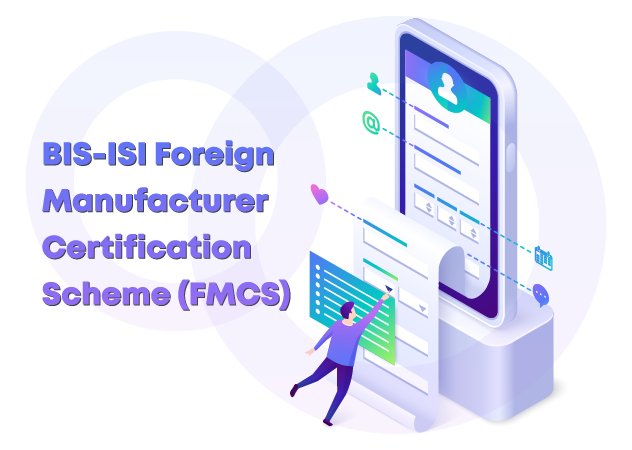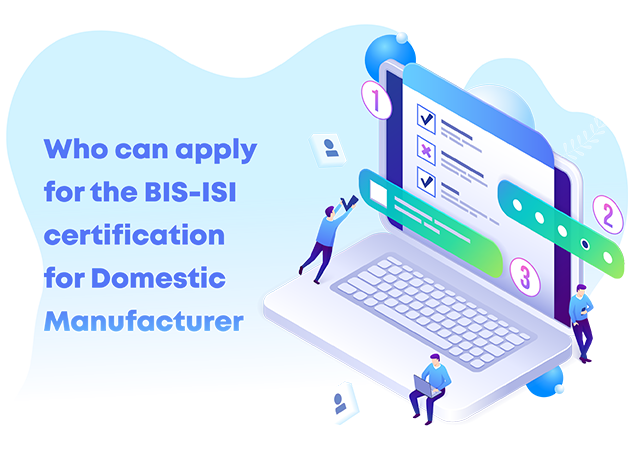ISI Certification
We at VINCULAR provide a one stop solution of BIS-ISI liscense for your Domestic and Foriegn factory.
What is ISI Mark?
ISI mark (Scheme-I of Schedule-II) is a certification mark for domestic and industrial products in India other than electronics & IT goods. The mark imposed on any product means that a product conforms to the Indian Standard. The ISI mark is mandatory for certain products to be sold in India like various electrical appliances, toys, safety glasses, LPG valves, tyres & tubes, Portland cement etc. But in the case of most other products, it is voluntary.
.
a) Normal Process and
b) Simplified Process
.
Different Categories of Certification:
Product Certification for Domestic Manufacturer. Further, the same is divided into two parts –a) Normal Process and
b) Simplified Process

BIS-ISI foreign manufacturer certification scheme (FMCS)

BIS has been operating a separate scheme named as FMCS (Foreign Manufacturer Certification Scheme) for foreign manufacturers since 2000. Under this scheme (Scheme-I of Schedule-II), foreign manufacturers can seek certification from BIS for use of Standard Mark (commonly known as ISI Mark) on their products. The aim of this scheme is to provide third-party guarantee of quality, safety and reliability of products to the end customer and broadly applicable for grant of license for all the products except Electronics & IT Goods notified by MeitY. Many products like electrical appliances, kitchen accessories, industrial products, steel products, toys, chemicals, Petro-chemicals and automobile accessories are mandatorily required to be registered under this order. Post registration, applicant will be eligible to put the ISI Mark on their desired products.
Who can apply for the BIS-ISI certification:
Manufacturers (who is actually producing the goods) having their company outside India can apply for FMCS license. The company shall ensure below listed points before applying for said license:
Conformation of their product according to suitable Indian Standard.
Have complete in-house manufacturing facility at the factory location.
Have complete in-house testing facility against the particular Indian Standard for which applicant would like to apply to obtain ISI Mark. Outsourcing is allowed up to some extent.
Have qualified & competent quality control staff in the manufacturer’s testing laboratory to test the desired product as per applicable Indian Standard.
Accept the Scheme of Testing & Inspection (STI).
Ready to pay the annual marking fee as decided by competent authority considering the large-scale manufacturer.
Separate application is required to be submitted for each product/Indian Standard and for factory location.
Have complete in-house manufacturing facility at the factory location.
Have complete in-house testing facility against the particular Indian Standard for which applicant would like to apply to obtain ISI Mark. Outsourcing is allowed up to some extent.
Have qualified & competent quality control staff in the manufacturer’s testing laboratory to test the desired product as per applicable Indian Standard.
Accept the Scheme of Testing & Inspection (STI).
Ready to pay the annual marking fee as decided by competent authority considering the large-scale manufacturer.
Separate application is required to be submitted for each product/Indian Standard and for factory location.

Procedure involved in taking BIS-ISI certification

STEP 1
We (VINCULAR) will help prepare the required documents followed by end-to-end coordination ...
We (VINCULAR) will help prepare the required documents followed by end-to-end coordination with the lab of product testing as per the applicable Indian Standard and submit the documents in hardcopy to the BIS department after the sign-stamp of the factory signatory & authorized Indian representative (AIR).
STEP 2
Post submission, the BIS officer will evaluate the application file and may raise the additional requirements (if any).
Post submission, the BIS officer will evaluate the application file and may raise the additional requirements (if any).
STEP 3
After that, the application will be placed in BIS records and the audit officer will be allotted for the respective case for inspection purposes ....
STEP 3
After that, the application will be placed in BIS records and the audit officer will be allotted for the respective case for inspection purposes who will conduct the on-site factory audit to verify the supporting submitted documents.
STEP 4
After the satisfactory visit, the BIS officer sealed some samples and sent the same ....
After the satisfactory visit, the BIS officer sealed some samples and sent the same for Independent testing. Once Independent testing is successful, BIS will release License No.
STEP 5
After getting the License, the factory has to submit the Indemnity Bond and Performance bank guarantee to the BIS department.
After getting the License, the factory has to submit the Indemnity Bond and Performance bank guarantee to the BIS department.
STEP 1
STEP 2
STEP 3
STEP 4
STEP 5
STEP 1
We (VINCULAR) will help prepare the required documents followed by end-to-end coordination with the lab of product testing as per the applicable Indian Standard and submit the documents in hardcopy to the BIS department after the sign-stamp of the factory signatory & authorized Indian representative (AIR).
STEP 2
Post submission, the BIS officer will evaluate the application file and may raise the additional requirements (if any).
STEP 3
After that, the application will be placed in BIS records and the audit officer will be allotted for the respective case for inspection purposes who will conduct the on-site factory audit to verify the supporting submitted documents.
STEP 4
After the satisfactory visit, the BIS officer sealed some samples and sent the same for Independent testing. Once Independent testing is successful, BIS will release License No.
STEP 5
After getting the License, the factory has to submit the Indemnity Bond and Performance bank guarantee to the BIS department.
Major documents require for the BIS-ISI certification:

Application Form-V
BIS Govt. Fees receipts
Factory registration documents
Details of the in-house machinery and testing equipment’s.
Recent calibration certificates in native as well as english language.
Flow chart and factory location map
Organizational chart and details of the quality control staff
Agreement copy, bank guarantee and Indemnity bond
3-D drawing of the product
Methods of disposal of sub-standard product
BIS Govt. Fees receipts
Factory registration documents
Details of the in-house machinery and testing equipment’s.
Recent calibration certificates in native as well as english language.
Flow chart and factory location map
Organizational chart and details of the quality control staff
Agreement copy, bank guarantee and Indemnity bond
3-D drawing of the product
Methods of disposal of sub-standard product
Timeline require to get BIS-ISI certification
In general, the entire process takes 5-6 months including testing & registration. For more information regarding the break-up of timeline against every step
BIS -ISI product certification scheme for domestic manufacturers
This scheme is only for domestic manufacturers located in India. The purpose of this scheme is to give customers a third-party assurance of the quality, safety and reliability of products. The presence of the ISI Mark known as the standard mark on the product is assured to conform to the specifications. ISI mark on the product provides new thrust to standardization, quality control, safety and reliability of the product for the consumers. Under this scheme (Scheme-I of Schedule-II), local manufacturers can seek certification from BIS for use of Standard Mark on their products. The product certification scheme comprises of two processes i.e. Simplified Process and Normal Process.
Who can apply for the BIS-ISI certification for domestic manufacturer:
Manufacturers (who is actually producing the goods) having their company within India can apply for domestic license. The company shall ensure below listed points before applying for said license:

Conformation of their product according to suitable Indian Standard.
Have complete in-house manufacturing facility at the factory location.
Have complete in-house testing facility against the particular Indian Standard for which applicant would like to apply to obtain ISI Mark. Outsourcing is allowed up to some extent.
Have qualified & competent quality control staff in the manufacturer’s testing laboratory to test the desired product as per applicable Indian Standard.
Accept the Scheme of Testing & Inspection (STI).
Ready to pay the annual marking fee as decided by competent authority.
Separate application is required to be submitted for each product/Indian Standard and for factory location.
Have complete in-house manufacturing facility at the factory location.
Have complete in-house testing facility against the particular Indian Standard for which applicant would like to apply to obtain ISI Mark. Outsourcing is allowed up to some extent.
Have qualified & competent quality control staff in the manufacturer’s testing laboratory to test the desired product as per applicable Indian Standard.
Accept the Scheme of Testing & Inspection (STI).
Ready to pay the annual marking fee as decided by competent authority.
Separate application is required to be submitted for each product/Indian Standard and for factory location.
BIS-ISI normal process for grant of license:
Manufacturers (who is actually producing the goods) having their company within India can apply for domestic license. The company shall ensure below listed points before applying for said license:
- Gathering of relevant information in order to prepare the application file. In this step, we shall prepare all the documents required as per BIS norms as well as guide the firm regarding the basic infrastructure i.e. machinery, testing equipment, quality of samples required as per Indian standard.
- Fulfil the gap (if any) at the initial level to avoid any non-conformity.

Application Preparation

Filing of Application
- Submission of application through online portal along with internal test report or report issued by BIS accredited laboratory and other supporting documents.
- BIS will scrutinize the application & will raise the queries, if any.
- Queries will be raised over online portal and further all the gaps need to be fulfilled by the applicant within stipulated timeline. Post query resolution, application will be considered as complete and it will be recorded.
- Preliminary inspection of the manufacturing unit is carried out on a mutually agreed date, within a month of recording of application.
- Remittance of Audit Fees & Travelling Expenses for Inspection.
- Organize the Ticket, Lodging & Boarding for audit officer.

Planning of Factory Inspection

On-site Factory Inspection
- Audit officer will visit the factory location to carryout verification of manufacturing & testing infrastructure as declared in the submitted application.
- During audit, officer may ask the testing personal of the factory to perform few of the random tests.
- Officer may ask questions related to testing, production and disposal of sub-standard products.
- Sample pick-up for independent testing.
- Submit the sample drawn by visiting team to the allocated laboratory along with the testing charges for independent testing.
- In general, such testing happens in any of the govt. laboratory only.
- Application file would be processed for grant of license after receipt of satisfactory inspection report & independent test report conforming to applicable Indian Standard.

Independent Testing of Product

Grant of License (CM/L-Number)
- Granting of registration number post satisfactory report against the testing done in any independent laboratory.
- Submission of minimum marking fee and other applicable dues, if any.
- Submission of remaining documents like Agreement, Indemnity bond etc.
- Post getting the registration number, applicant will have to follow the terms & conditions associated with the license and further they will be eligible to put the ISI Mark on their particular tested product.
BIS ISI simplified process for grant of license:
Simplified process is exclusively applicable for domestic manufacturers to get the registration number (CM/L- Number) in limited time period. Under this, process of grant of license is expected to be completedwithin 30-35 days from the date of submitting the hardcopy documents in BIS. Further, it depends up on the satisfactory factory visit and conformance of sample to the relevant Indian Standards is established at the first instance.
- Gathering of relevant information in order to prepare the application file. In this step, we shall prepare all the documents required as per BIS norms as well as guide the firm regarding the basic infrastructure i.e. machinery, testing equipment, quality of samples required as per Indian standard.
- Fulfil the gap (if any) at the initial level to avoid any non-conformity.

Application Preparation

Filing of Application
- Submission of application through online portal along with internal test report or report issued by BIS accredited laboratory and other supporting documents.
- BIS will scrutinize the application & will raise the queries, if any.
- Queries will be raised over online portal and further all the gaps need to be fulfilled by the applicant within stipulated timeline. Post query resolution, application will be considered as complete and it will be recorded.
- Preliminary inspection of the manufacturing unit is carried out on a mutually agreed date, within a month of recording of application.
- Remittance of Audit Fees & Travelling Expenses for Inspection.
- Organize the Ticket, Lodging & Boarding for audit officer.

Planning of Factory Inspection

On-site Factory Inspection
- Audit officer will visit the factory location to carryout verification of manufacturing & testing infrastructure as declared in the submitted application.
- Each and everything as declared in the submitted documents will be minutely checked and verified including quality control facilities, production facility, factory layout, process flow, information related to raw materials, hygienic conditions etc.
- Licence to use the ISI Mark on a product is granted only after the audit officer has ensured the capability of the applicant to manufacture the product in conformity to the relevant Indian Standard on a continuous basis. Further, the application would be processed for grant of licence after receipt of satisfactory inspection report.
- Sample drawn/pick-up for independent testing.
- Submit the sample drawn by visiting team to the allocated laboratory along with the testing charges for independent testing.
- In general, such testing happens in any of the govt. laboratory only.
- The results for the independent should be complied to the relevant Indian Standard.
- In case of any non-conformity observed against the drawn samples, the license shall be suspended immediately. Further, the licensee shall take necessary corrective actions and inform the same to the BIS and also confirm its readiness to offer fresh samples manufactured after taking the corrective actions. The re vocation of suspension in such cases shall be considered only on the basis of conforming Testing Reports of the fresh samples from a BIS Recognized Testing Laboratory.
- In case the fresh sample drawn by the BIS for consideration of revocation of suspension shows non-conformity in laboratory testing, or the licensee does not inform corrective actions taken and does not offer improved samples within 30 days of the date of suspension, then the license shall be processed for cancellation.

Independent Testing of Product

Closure of Non-Conformity
- Rectify the process of factory unit, if inspection team points out.
- Submit the proof of rectification done by manufacturing unit to close non-conformity (NC closure), if any.
Major BIS-ISI document for domestic manufacturer

BIS Govt. Fees receipts
Factory registration documents
Details of the in-house machinery and testing equipment’s.
Recent calibration certificates in native as well as english language.
Flow chart and factory location map
Organizational chart and details of the quality control staff
Agreement copy, bank guarantee and Indemnity bond
3-D drawing of the product
Methods of disposal of sub-standard product
Factory registration documents
Details of the in-house machinery and testing equipment’s.
Recent calibration certificates in native as well as english language.
Flow chart and factory location map
Organizational chart and details of the quality control staff
Agreement copy, bank guarantee and Indemnity bond
3-D drawing of the product
Methods of disposal of sub-standard product
FAQs
Although the BIS certification program is generally voluntary, certain products that have been identified by the Indian government under Quality Control Orders may only be imported into India with the Standard Mark and a current BIS license. You can find a list of these products at https://www.bis.gov.in/index.php/product-certification/products-undercompulsory-certification/.
Not accepted; only test results in accordance with the relevant Indian Standard will be accepted.
No, each factory must submit a separate application for each item and Indian Standard.
No, a product at a manufacturing facility is the subject of the application for a license. The business must submit an undertaking for the brand name along with the necessary paperwork. Appreciations from client
No, the samples drawn during inspection shall be tested only in the laboratories of BIS and those recognized by BIS. The sample drawn by BIS shall be sent to Laboratory in India by the applicant firm. The actual testing charges shall be borne by the applicant firm.
No, the samples taken during the inspection may only be tested in BIS-accredited laboratories. The applying firm must send the BIS sample to a laboratory in India. The applicant firm is responsible for paying the actual testing costs.
The registration to the Food Business Operator is granted basis on the following location of the premises of its operation; General, Railway Station, Airport/Seaport.

